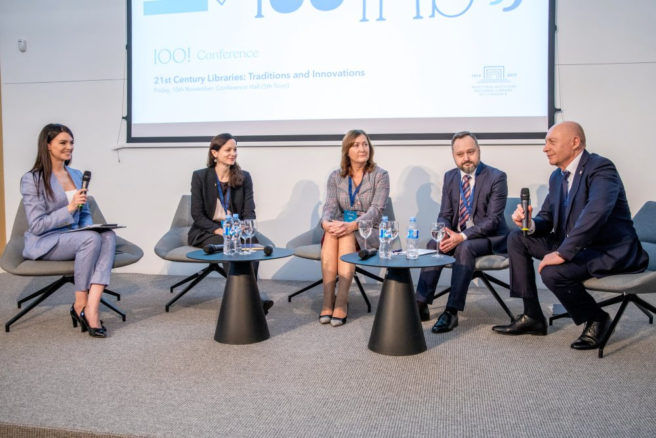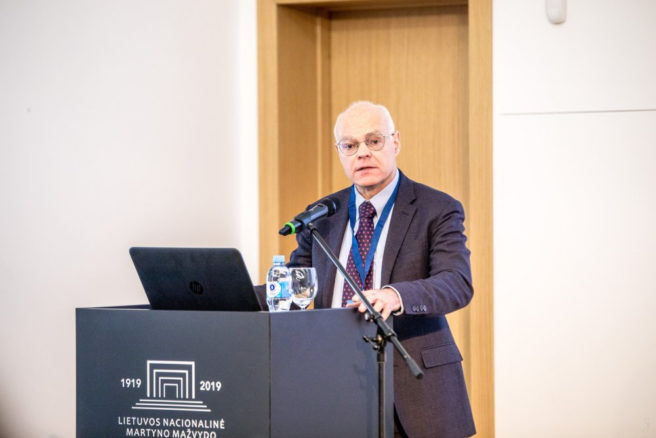The aims and objectives of the activity was to highlight common problems ailing the 21st century libraries, to discuss among participants and guests the common questions and share visions about the role, partnerships and opportunities of the libraries and their impact on the society of the 21st century. To make conclusions and intentions that will affect the stimulation of the further dialogue and cooperation.
The expectations and vision was to make the Conference that will serve as a platform for communication, finding answers to relevant questions, sharing best practice and agree on future plans.
On behalf of its centenary celebrations, Martynas Mažvydas National Library of Lithuania organized an international research conference. At the conference’s main session, Prof. Luiz Oosterbeek, UNESCO Chairholder in Humanities and Cultural Integrated Landscape Management, Polytechnic Institute of Tomar, and Secretary-General of the International Council of Philosophy and Human Sciences (CIPSH) shared his insights and experiences regarding critical reasoning and flexibility; Liz Jolly, Chief Librarian of the British Library spoke about collaborating to advance knowledge and mutual understanding among librarians, partners and leaders; and Dr. Jānis Krēsliņš, Senior Academic Librarian for Research Affairs at the National Library of Sweden, gave the presentation “Memory in a Time of Digital Inattentiveness: an Institutional Perspective”.
The conference’s introductory presentation “Life Library as a Model” given by the Director General of the Martynas Mažvydas National Library of Lithuania Prof. Dr. Renaldas Gudauskas. In the words of the National Library’s executive, the impressive anniversary of the Library presents a favourable opportunity to evaluate the gained experience and continue the Library’s success story during the second century of its existence with new energy and ideas.
Among the participants of the Discussion, there were the executives of three national libraries: the Director General of the National Library of Estonia Janne Andresoo, the Director General of the National Library of Poland Dr. Tomasz Makowski and the Director General of Martynas Mažvydas National Library of Lithuania Prof. Dr. Renaldas Gudauskas. Participants were discussing on issues regarding the importance of partnerships and their potential, the impact of change of spaces within buildings on the origination of new activities and the news from the life of the professional communities from the neighbouring countries and their vision of the developments of libraries in the 21st century. The musicologist Gerūta Griniūtė moderated the Discussion.

The Conference was made of the main session with plenary reports and discussion. The plenary reports highlighted common problems ailing the 21st century libraries. Professionals from libraries of Lithuania and other countries will continue the analysis of these problems.


After the main session, there was a discussion where participants tried to answer the questions and share visions about the role, partnerships and opportunities of the libraries and their impact on the society of the 21st century.
The intention of the Conference is that important issues addressed in reports and discussions will stimulate further dialogue and cooperation. The Conference has served as a perfect platform for communication, finding answers to relevant questions, sharing best practice and agree on future plans.




Guests and participants of the Conference were greeted by the Head of the Political Communication Department of the Institute of Journalism at the Vilnius University‘s Faculty of Communication Prof. Dr. Andrius Vaišnys. Who reminded the audience about the historical origins of the National Library’s establishment and wished to use all that is best and most advanced within the global information network, i.e. knowledge and services provided by library professionals.
The introductory report “Life Library as a Model” was given by the Director General of Martynas Mažvydas National Library of Lithuania Prof. Dr. Renaldas Gudauskas. To quote Mr Gudauskas, “The solid anniversary of the Library presents a favourable opportunity to evaluate the experience that we gained and continue the National Library’s success story during the second centenary of its existence with new ideas and energy. Libraries exist within the society under transformation. Therefore nowadays the main trend for library activities is change management. It is important for libraries to identify tendencies of the society’s advancement and become part of these tendencies. Though operating within the transforming world, the National Library continues its key mission: during the era of digitization, Big Data and artificial intellect, to preserve and manage all that was created by the nation through centuries.”
During the main session, there was a report delivered by Prof. Luiz Oosterbeek, UNESCO Chair holder in Humanities and Cultural Integrated Landscape Management, Polytechnic Institute of Tomar, Portugal, and Secretary-General of the International Council for Philosophy and Human Science. His report was about critical thinking and flexibility. Luiz Oosterbeek’s research interests include archaeology, philosophy and landscape management. He is the author of more than 300 research publications and 50 books, president of Instituto Terra e Memoria and visiting professor at several universities in Europe, Africa, America and Asia. To quote Prof. Oosterbeek, “The society should focus on underlying units of knowledge capable to unite diverse or even conflicting groups and their interests. In this context, the role of libraries has never been so vital not only in providing access to information and culture but also in achieving maximum use of possibilities offered by digital technologies as well as communicating a clear message that there can be no substitute for that which is palpable, e.g. books, if a person does not wish to be merely a user and wants his voice to be heard in solving issues as regards the future. Both national public and central libraries must cooperate with the educational system and become a pivotal component of the integrated and sustainable territorial development.”
The Chief Librarian of the British Library, Liz Jolly, spoke about collaborating to advance knowledge and mutual understanding among librarians, partners and leaders. Liz Jolly has accumulated huge experience at diverse institutions within the academic sector. To quote Ms Jolly, “Within the changing world, libraries encounter exclusive problems. In order to successfully solve them, it is essential to promote leadership and increase professional experience. However, the most possibilities in this regard are offered by the wish of professionals and institutions in this field to act together. Liz Jolly is a member of the editorial board of the journal New Review of Academic Librarianship.
Jānis Krēsliņš, Senior Academic Librarian for Research Affairs at the National Library of Sweden, presented the report “Memory in a Time of Digital Inattentiveness: An Institutional Perspective”. By engaging in an integrated fashion the rich, but seemingly disjoint collections, he has been able to reassess the various meanings of intellectual history and transgress borders between various disciplines and periods